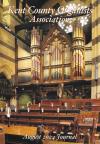Organ Music at The Meeting House University of Sussex
Two concerts by D'Arcy Trinkwon
26th November
Mendelssohn Sonata Op.65 No. 3 in A
Bach Eight Short Preludes and Fugues
Bruhns Fantasia: Nun Komm' der Heiden Heiland
Dupre Vespres de Communion de la Saint Verge (Fifteen Pieces) Op.18 (two or three)
Pierre Variations er fugue sur trois noels Normandie
This month – two requests: Mendelssohn’s 3rd Sonata and Bach’s 8 Short Preludes & Fugues…
The opening movement of Mendelssohn’s A major Sonata was completed in 1844 just a month before he completed his violin concerto. It includes a splendid fugue, a Lutheran chorale (‘Out of the depths have I cried unto Thee’) and is framed by a grand, heraldic sections. There is a beautiful, gentle second movement.
Bach’s Short preludes & fugues rarely ever get heard in concerts. That many - even most - organists have struggled to learn these during their early days of organ lessons have perhaps sullied their reputation as these early approaches and attempts likely rarely flatter the pieces or show their full potential: whilst obviously lacking the grandeur and profundity of the great works, they do have an easy charm, good humour and some beautiful moments.
Nikolaus Bruhns born in 1865, i.e. 20 years before Bach: an eminent organist of the North German tradition, his example cast a decided influence on Bach. His Fantasia on the Lutheran Advent chorale ‘Come now, Thou Saviour of the heathen’ is, in effect, a fascinatingly coloured series of variations. Bruhns quite often took up his violin and strummed merrily on it whilst accompanying himself on the organ pedals at the same time! Something I will not be attempting…
To end – teacher and pupil… Dupré made his first UK appearance at London’s Royal Albert Hall – brought over by Claude Johnson, who was the managing director of Rolls Royce: in the concert Dupré improvised commentaries on 15 versets of Vesper chants which he later wrote down as ‘Fifteen Pieces’ (although the French title is much more poetic); I’ll play two or three.
My teacher Odile Pierre (1932-2020) was one of Dupré last pupils and, like him, was born in Rouen where she began her organ lessons with his pupil Lanquetuit at the cathedral before going to Paris to Dupré’s famous Concservatoire class. One of the great French organists, she became one of the great women organists of the world; in 1969, she succeeded the legendary Jeanne Demessieux (who had died tragically at just 47) as organiste-titulaire of the famous Madeleine church in the heart of tourist Paris. Mme. Pierre only began to compose in her later years: her fascinating noël variations of 1987 offer a wonderfully fascinating compendium of invention – all kinds of unheard textures, colours and humour can be heard.
10th December
Bach Prelude: Nun Komm' der Heiden Heiland, BMV659
Messiaen La Nativite du Seigneur
Messiaen’s 1935 masterpiece of 9 meditations is, remarkably, 90 years old ! This cyclee of atmsopheric and transporting pieces was written as a direct expression and exploration of his devout Catholic faith: there are nine movements to honour the Blessed Virgin. Other than Tournemire, not since the French Baroque period had organist-composers sought to compose overtly religious works for their instrument and these spiritual pieces, with their abundance of musical and instrumental innovations, must have been a genuine revelation.
It may seem unlikely to some to present this work on the Meeting House organ because it is an instrument designed on a completely different musical axis to the great French instruments Messiaen knew well. Messiaen himself continually reinvented and changed his registrations – the comparison of the directions in the printed scores to what he himself actually did reveals this – and just so, here in the Meeting House I will have to conjur effects and to cajole the instrument with a good deal of wizardry to bring the colours of the music to life. Can’t be done ? Come and listen…
To set the atmosphere for the Messiaen, I will preface it with Bach’s chorale prelude BWV659 on the Lutheran Advent chorale ‘Nun komm’ der Heiden Heiland’ (‘Come now, Thou saviour of the heathen’). A work of profound spiritual power, it is one of the wonders of his chorale-based pieces; many great composers have been in awe of it…

